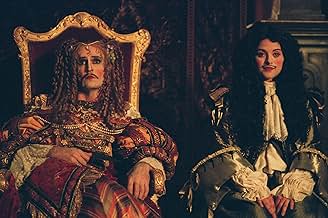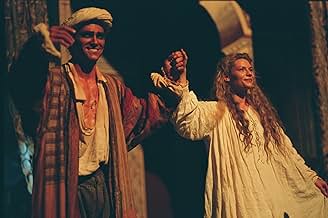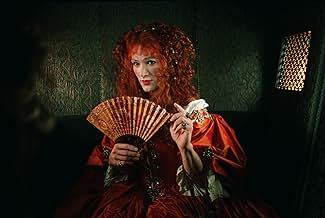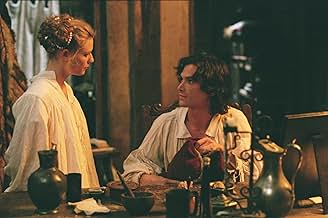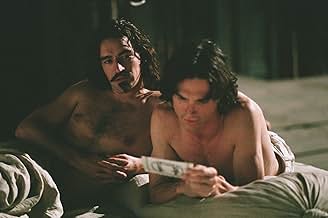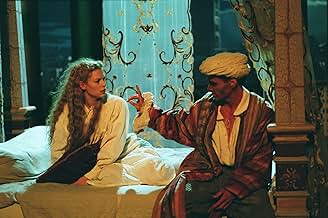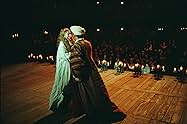VALUTAZIONE IMDb
7,1/10
10.979
LA TUA VALUTAZIONE
Una commessa di teatro femminile accende una rivoluzione in un teatro londinese del diciassettesimo secolo interpretando Desdemona in Otello.Una commessa di teatro femminile accende una rivoluzione in un teatro londinese del diciassettesimo secolo interpretando Desdemona in Otello.Una commessa di teatro femminile accende una rivoluzione in un teatro londinese del diciassettesimo secolo interpretando Desdemona in Otello.
- Premi
- 4 vittorie e 1 candidatura in totale
Recensioni in evidenza
"All the world's a stage," wrote the Bard, "and all the men and women merely players that strut and fret their hour upon the stage."
"Stage Beauty" is set in the world of seventeenth-century Restoration theatre, but the stage serves as a microcosm for life itself, and the roles played by the actors before the public mirror the roles they play in their private lives. The question is, do they create their roles, or do their roles create them?
Ned Kynaston (Billy Crudup) is an actor who takes on women's roles, since real women are not permitted to do so. He has been thoroughly trained and schooled in the then highly stylized technique of portraying women -- to such an extent that any trace of masculinity seems to have been drummed out of him.
His dresser Maria (Clare Danes) yearns to be an actress herself, but is prevented from doing so by the narrow conventions of Puritan England -- until Charles II is restored to the throne and decrees that, henceforth, real women shall play women's roles on the stage. A whole new world opens up for Maria, but it looks like curtains for Ned.
What happens next is pure anachronism: Ned and Maria are able to rise above the limitations and constraints of their era. Not only do they transcend their gender or sex roles, but they overcome their classical training and, in effect, engage in Method acting, a technique still three hundred years away in the far-distant future. When he teaches Maria how to break the mold and play Othello's Desdemona in a whole new, natural way, Ned becomes a seventeenth-century Stanislavsky.
But, by George, it works. Their performance of the celebrated death scene from "Othello" sends shock waves through an audience accustomed to pantomime and exaggerated gestures -- and it electrifies us as well.
Not since Joseph Fiennes and Gwyneth Paltrow in "Shakespeare in Love" have an actor and actress so shimmered and shone simultaneously on stage and screen. One hopes that Billy Crudup and Clare Danes will be remembered for their luminous performances at the 2005 Academy Awards.
"Stage Beauty" is set in the world of seventeenth-century Restoration theatre, but the stage serves as a microcosm for life itself, and the roles played by the actors before the public mirror the roles they play in their private lives. The question is, do they create their roles, or do their roles create them?
Ned Kynaston (Billy Crudup) is an actor who takes on women's roles, since real women are not permitted to do so. He has been thoroughly trained and schooled in the then highly stylized technique of portraying women -- to such an extent that any trace of masculinity seems to have been drummed out of him.
His dresser Maria (Clare Danes) yearns to be an actress herself, but is prevented from doing so by the narrow conventions of Puritan England -- until Charles II is restored to the throne and decrees that, henceforth, real women shall play women's roles on the stage. A whole new world opens up for Maria, but it looks like curtains for Ned.
What happens next is pure anachronism: Ned and Maria are able to rise above the limitations and constraints of their era. Not only do they transcend their gender or sex roles, but they overcome their classical training and, in effect, engage in Method acting, a technique still three hundred years away in the far-distant future. When he teaches Maria how to break the mold and play Othello's Desdemona in a whole new, natural way, Ned becomes a seventeenth-century Stanislavsky.
But, by George, it works. Their performance of the celebrated death scene from "Othello" sends shock waves through an audience accustomed to pantomime and exaggerated gestures -- and it electrifies us as well.
Not since Joseph Fiennes and Gwyneth Paltrow in "Shakespeare in Love" have an actor and actress so shimmered and shone simultaneously on stage and screen. One hopes that Billy Crudup and Clare Danes will be remembered for their luminous performances at the 2005 Academy Awards.
When the British make a costume drama it is simply a feast for the senses: Luminous colours in the most beautiful shades of red, gold and brown, costumes full of little details and precious jewelry and a great music score that takes you straight to Shakespearian and Bronte England. Now, a new precious jewel of the British cinema comes to film theatres and from my first impression it could be the best film of this year (well, at least until the new Harry Potter comes out).
The topic is more or less familiar from "Shakespeare in love": It is the drama of this time when women wanted to act on stage but only men were allowed to do so. While "Shakespeare in love" showed this drama from a female point of view, "Stage Beauty" deals with a man whose life falls to bits and peaces when a woman plays a woman and achieves a change of law which now allows women to act on stage.
Ned Kinaston (Billy Crudup) is a stage beauty, means: A male actor who is skilled in and specialized on strictly performing female roles. He had done so for years, can do it like no other and play nothing else. He is a star and the best stage beauty in London. Like every star, Ned has someone who cares for him, knows all his wishes on and behind the stage and holds his feet on earth: It is Maria (Claire Danes), the girl who cares for his wigs, his make-up and his costumes. Maria does not only love Ned, she lives for the theatre and dreams to be on stage herself. One night she "borrows" Ned's costumes and wig and makes her dream illegally come true on a little stage. She is a full success and so sets the wheels in motion: A duke has seen her performance, a duke who has connections to the king and soon the law is changed: Women are allowed to act on stage now. Kinaston sees the end of his career and drowns in despair. But it is Maria again who might save him.
A fascinating tale about men in dresses, women in tights and the theatre in Shakespearean England. But "Stage Beauty" is so much more. It is about two people whose heart belongs to the theatre and who are so deep into it that reality and fiction is sometimes a dangerous mix. It is about a man and a woman who find their way in a time where this way seems not to exist. It is dramatic, sometimes wonderfully romantic and fragile, very entertaining and simply beautiful.
Hands down for Billy Crudup's performance: This beautiful man is not bad as a woman, but basically the film celebrates his male beauty. When he is on stage he's incredible and when he's off stage he's simply hot but also convincing when facing the greatest crisis of his life (in his role I mean). But actually the person carrying the film is a fantastic Claire Danes. Once again she is playing Shakespeare, this time not Julia but Desdemona. She is strong, she is beautiful, she is courageous but also sympathetic. The supporting cast is what every director and viewer can only dream of: It includes Tom Wilkinson, Rupert Everett, Hugh Bonneville and Ben Chaplin.
If you haven't seen this film yet, do so, it's a great experiences. It enchants, it gives your dreams wings, hope and strength. And is great entertainment, too.
The topic is more or less familiar from "Shakespeare in love": It is the drama of this time when women wanted to act on stage but only men were allowed to do so. While "Shakespeare in love" showed this drama from a female point of view, "Stage Beauty" deals with a man whose life falls to bits and peaces when a woman plays a woman and achieves a change of law which now allows women to act on stage.
Ned Kinaston (Billy Crudup) is a stage beauty, means: A male actor who is skilled in and specialized on strictly performing female roles. He had done so for years, can do it like no other and play nothing else. He is a star and the best stage beauty in London. Like every star, Ned has someone who cares for him, knows all his wishes on and behind the stage and holds his feet on earth: It is Maria (Claire Danes), the girl who cares for his wigs, his make-up and his costumes. Maria does not only love Ned, she lives for the theatre and dreams to be on stage herself. One night she "borrows" Ned's costumes and wig and makes her dream illegally come true on a little stage. She is a full success and so sets the wheels in motion: A duke has seen her performance, a duke who has connections to the king and soon the law is changed: Women are allowed to act on stage now. Kinaston sees the end of his career and drowns in despair. But it is Maria again who might save him.
A fascinating tale about men in dresses, women in tights and the theatre in Shakespearean England. But "Stage Beauty" is so much more. It is about two people whose heart belongs to the theatre and who are so deep into it that reality and fiction is sometimes a dangerous mix. It is about a man and a woman who find their way in a time where this way seems not to exist. It is dramatic, sometimes wonderfully romantic and fragile, very entertaining and simply beautiful.
Hands down for Billy Crudup's performance: This beautiful man is not bad as a woman, but basically the film celebrates his male beauty. When he is on stage he's incredible and when he's off stage he's simply hot but also convincing when facing the greatest crisis of his life (in his role I mean). But actually the person carrying the film is a fantastic Claire Danes. Once again she is playing Shakespeare, this time not Julia but Desdemona. She is strong, she is beautiful, she is courageous but also sympathetic. The supporting cast is what every director and viewer can only dream of: It includes Tom Wilkinson, Rupert Everett, Hugh Bonneville and Ben Chaplin.
If you haven't seen this film yet, do so, it's a great experiences. It enchants, it gives your dreams wings, hope and strength. And is great entertainment, too.
'Without beauty, there's nothing. Who could love that?' (Ned Kynaston, Stage Beauty)
Don't expect an elegant historical romp from Stage Beauty; it's much more than that. Director Richard Eyre (Iris) and screenwriter Jeffrey Hatcher have loosely interpreted true events to deliver a passionate, romantic journey of gender-bending self-realisation set in the bawdy world of the British Restoration, circa 1660.
In a time when women are banned from acting on stage, King Charles II is on the throne, accompanied everywhere by his vulgar but merry mistress, Nell Gwnn. Meanwhile Ned Kynaston (Billy Crudup) is the most celebrated leading lady of his time. He is adored by his audiences, by his lover and patron the Duke of Buckingham, and secretly loved by his dresser Maria (Claire Danes). But when aspiring actress Maria's illegal performance as Desdemona in Othello triggers royal permission for women to act on stage, Kynaston's fall from grace is swift.
This is an actors' film, where the talents of Danes and in particular, Crudup, shine. (Their remarkable relationship triggered an off-screen romance.) Crudup is taut as the bisexual Kynaston, trained to be a calamity and actress since early adolescence, and emotes powerfully as he struggles with his sexuality and identity in an unfriendly new political landscape. He is alternately a catty drag queen, angry young man and committed thespian, without ever straying beyond credibility. In contrast, Danes is luminous but unsure as Maria. A talented supporting cast includes Rupert Everett, providing comic relief as the languid King, while Ben Chaplin is sensual as the self-serving Duke.
Stage Beauty has been compared to Shakespeare in Love, but although it's less successful, it's far less contrived. Although Stage Beauty is a love story, you don't know how things will resolve. The pace is less brisk than in a more manufactured film, but it's also more realistic, enhanced by production design and costuming which depicts both the grit and the sumptuousness of the time.
While at first the on stage acting grates, it is deliberate. As Stage Beauty progresses, the acting technique evolves to resemble 19th Century Naturalism not true to life, but faithful to the emotional journey of the characters. It's a special film that will take you on an emotional journey too.
**** out of ***** stars.
Don't expect an elegant historical romp from Stage Beauty; it's much more than that. Director Richard Eyre (Iris) and screenwriter Jeffrey Hatcher have loosely interpreted true events to deliver a passionate, romantic journey of gender-bending self-realisation set in the bawdy world of the British Restoration, circa 1660.
In a time when women are banned from acting on stage, King Charles II is on the throne, accompanied everywhere by his vulgar but merry mistress, Nell Gwnn. Meanwhile Ned Kynaston (Billy Crudup) is the most celebrated leading lady of his time. He is adored by his audiences, by his lover and patron the Duke of Buckingham, and secretly loved by his dresser Maria (Claire Danes). But when aspiring actress Maria's illegal performance as Desdemona in Othello triggers royal permission for women to act on stage, Kynaston's fall from grace is swift.
This is an actors' film, where the talents of Danes and in particular, Crudup, shine. (Their remarkable relationship triggered an off-screen romance.) Crudup is taut as the bisexual Kynaston, trained to be a calamity and actress since early adolescence, and emotes powerfully as he struggles with his sexuality and identity in an unfriendly new political landscape. He is alternately a catty drag queen, angry young man and committed thespian, without ever straying beyond credibility. In contrast, Danes is luminous but unsure as Maria. A talented supporting cast includes Rupert Everett, providing comic relief as the languid King, while Ben Chaplin is sensual as the self-serving Duke.
Stage Beauty has been compared to Shakespeare in Love, but although it's less successful, it's far less contrived. Although Stage Beauty is a love story, you don't know how things will resolve. The pace is less brisk than in a more manufactured film, but it's also more realistic, enhanced by production design and costuming which depicts both the grit and the sumptuousness of the time.
While at first the on stage acting grates, it is deliberate. As Stage Beauty progresses, the acting technique evolves to resemble 19th Century Naturalism not true to life, but faithful to the emotional journey of the characters. It's a special film that will take you on an emotional journey too.
**** out of ***** stars.
He is exquisite, Billy Crudup I mean, but not as a woman. Strangely enough he is more feminine as a man than he is as a woman. Look at him in "Almost Famous" perfect. Shaped like a flamenco dancer, rhythmic, sexual, casually overpowering. In "Jesus's Son" just by waking up at the beginning of the film, he, his character, gets you. Here he seems at odds with the feminine aspect of his character. His Desdemona is a performance. What perhaps I'm saying is that I admired the performance but I didn't feel it. I was aware of its quality but I couldn't taste it, as I have done with previous Billy Crudup creations. Another strange thing, Clare Danes. I think she's one of the most interesting actresses of her generation and here you enjoy her enormously when she's on but her character is now a blurry dot in my memory. What remains most vividly in my mind is Rupert Everett's sensational turn as King Charles. All said and done, try not to miss it.
I had heard of the film through tadbloid and celebrity headlines of how Billy Crudup left his seven month pregnant girlfriend, Mary-Louise Parker, for Claire Danes. I wasn't interested in the film, but then my sister got the DVD for her birthday. I saw it for the first time over the week and I have been watching it over and over again. What a beautifully written story about acting, gender, theater, illusion, romance, and discovery of one's own identity. During the Restoration of England under the reign of King Charles II, women were finally given the freedom and right to perform on the stage whereas before the decree it was illegal and obscene for a woman to perform on stage.
Ned Kynaston (Billy Crudup) is the greatest actor and the most beautiful "woman" of the English stage. He played several women's part and his most famous is the role of Desdemona in William Shakespeare's Othello. He is studied, admired, loved, and envied by his dress keeper, Maria (Claire Danes). She watches from the wings and longs to act and she does so behind Kynaston's back and in low pubs before a royal official, the Duke of Buckingham (Ben Chaplin). Then the chain of events unfold as Maria is introduced to Charles II (Rupert Everett) and his mistress Nell Gwyn (Zoe Tapper) who then declares that women will be given the freedom to perform in theater.
As Maria's fame rises and women are playing more and more of the female roles, Ned Kynaston (the last of his kind of actors) is casted aside. As an actor and as man, Kynaston had learned to suppress all masculinity in order to gain the grace and beauty of a woman. He knows only how to portray women and he is lost in learning to play male roles. But then again Maria is unable to play the role of Desdemona as a real woman. Both Kynaston and Maria fall in love and into passion as they learn from each other their own sexual identities and to channel their femininity and masculinity.
I fell in love with the film's story and with the performances of Billy Crudup and Claire Danes. As Kynaston, Crudup reveals vulnerability and strength as a man who discovers himself as a man (and a very hot one at that) through the role and eyes of being a woman. As Maria, Danes is beautiful and real: those tears are real! She can cry on cue and with the heartbreak of a real woman in love and envious of the man she loves. Maria is a strong, forthcoming, and in way a modern actress ahead of her time. She is not an "Eve" from All About Eve, she is a Viola Delesop from Shakespeare In Love, but real. The love scene between Danes and Crudup is sexy, tender, and passionate showing that explicit sex and nudity is not always necessary. They look into each other's sides and truly learn from each other as man and woman.
This is a highly recommended film for those who love acting, period pieces, or just if you want to see a really good film, "Stage Beauty" is very much the film to watch.
Ned Kynaston (Billy Crudup) is the greatest actor and the most beautiful "woman" of the English stage. He played several women's part and his most famous is the role of Desdemona in William Shakespeare's Othello. He is studied, admired, loved, and envied by his dress keeper, Maria (Claire Danes). She watches from the wings and longs to act and she does so behind Kynaston's back and in low pubs before a royal official, the Duke of Buckingham (Ben Chaplin). Then the chain of events unfold as Maria is introduced to Charles II (Rupert Everett) and his mistress Nell Gwyn (Zoe Tapper) who then declares that women will be given the freedom to perform in theater.
As Maria's fame rises and women are playing more and more of the female roles, Ned Kynaston (the last of his kind of actors) is casted aside. As an actor and as man, Kynaston had learned to suppress all masculinity in order to gain the grace and beauty of a woman. He knows only how to portray women and he is lost in learning to play male roles. But then again Maria is unable to play the role of Desdemona as a real woman. Both Kynaston and Maria fall in love and into passion as they learn from each other their own sexual identities and to channel their femininity and masculinity.
I fell in love with the film's story and with the performances of Billy Crudup and Claire Danes. As Kynaston, Crudup reveals vulnerability and strength as a man who discovers himself as a man (and a very hot one at that) through the role and eyes of being a woman. As Maria, Danes is beautiful and real: those tears are real! She can cry on cue and with the heartbreak of a real woman in love and envious of the man she loves. Maria is a strong, forthcoming, and in way a modern actress ahead of her time. She is not an "Eve" from All About Eve, she is a Viola Delesop from Shakespeare In Love, but real. The love scene between Danes and Crudup is sexy, tender, and passionate showing that explicit sex and nudity is not always necessary. They look into each other's sides and truly learn from each other as man and woman.
This is a highly recommended film for those who love acting, period pieces, or just if you want to see a really good film, "Stage Beauty" is very much the film to watch.
Lo sapevi?
- QuizClaire Danes and Billy Crudup became a couple after the filming of this movie. Crudup left his long-time girlfriend Mary-Louise Parker for Danes.
- BlooperNed Kynaston, age 20-something, says that he's been playing women on stage for half his life, since he was a child. But at the royal banquet, the King says that the theatres have only recently reopened after an 18-year shutdown caused by the Puritan takeover.
- Citazioni
King Charles II: Why shouldn't we have women on stage? After all, the French have been doing it for years.
Sir Edward Hyde: Whenever we're about to do something truly horrible, we always say that the French have been doing it for years.
I più visti
Accedi per valutare e creare un elenco di titoli salvati per ottenere consigli personalizzati
- How long is Stage Beauty?Powered by Alexa
Dettagli
- Data di uscita
- Paesi di origine
- Siti ufficiali
- Lingua
- Celebre anche come
- Compleat Female Stage Beauty
- Luoghi delle riprese
- Aziende produttrici
- Vedi altri crediti dell’azienda su IMDbPro
Botteghino
- Lordo Stati Uniti e Canada
- 782.383 USD
- Fine settimana di apertura Stati Uniti e Canada
- 38.654 USD
- 10 ott 2004
- Lordo in tutto il mondo
- 2.307.092 USD
- Tempo di esecuzione1 ora 46 minuti
- Mix di suoni
- Proporzioni
- 2.35 : 1
Contribuisci a questa pagina
Suggerisci una modifica o aggiungi i contenuti mancanti



